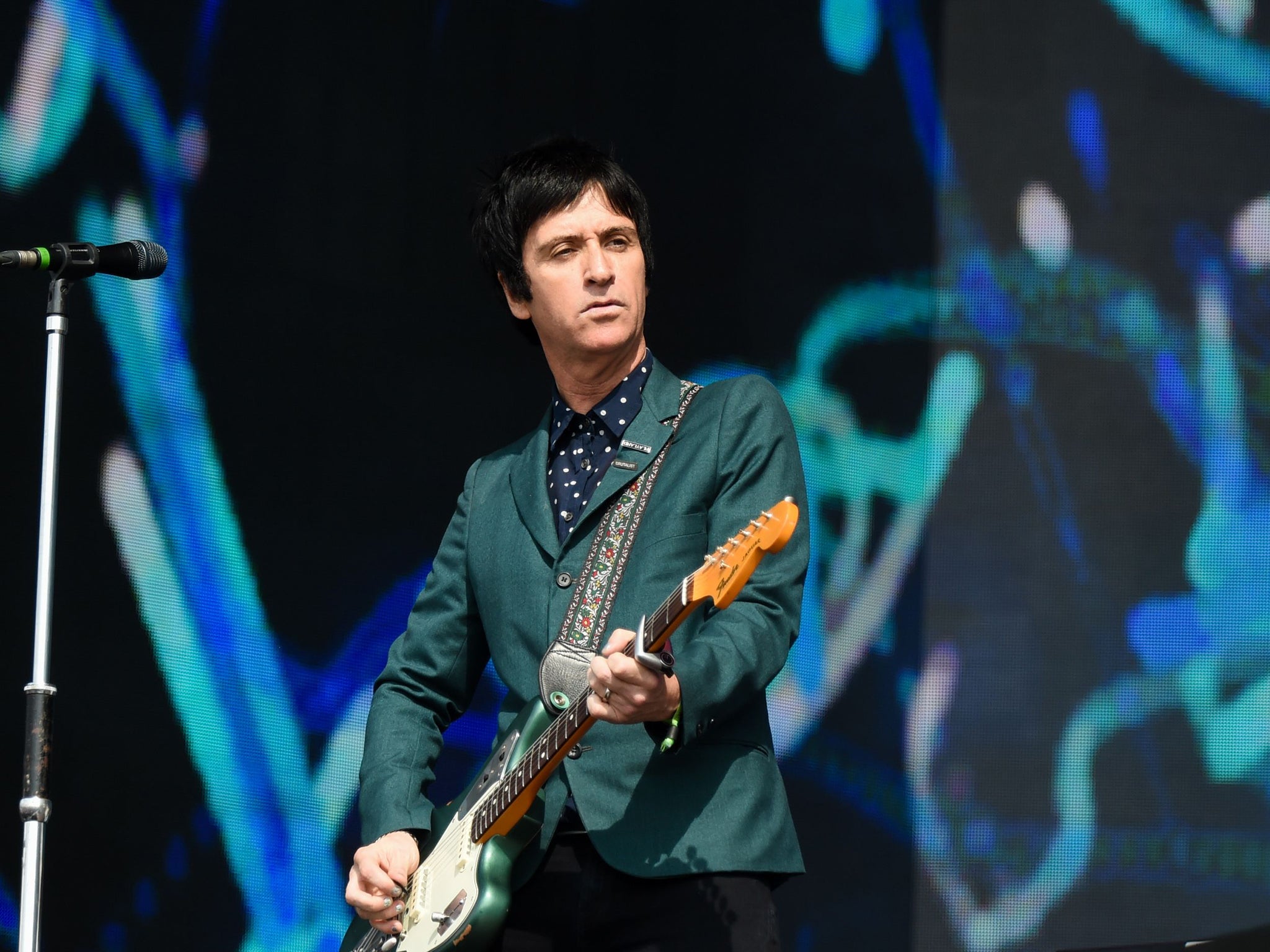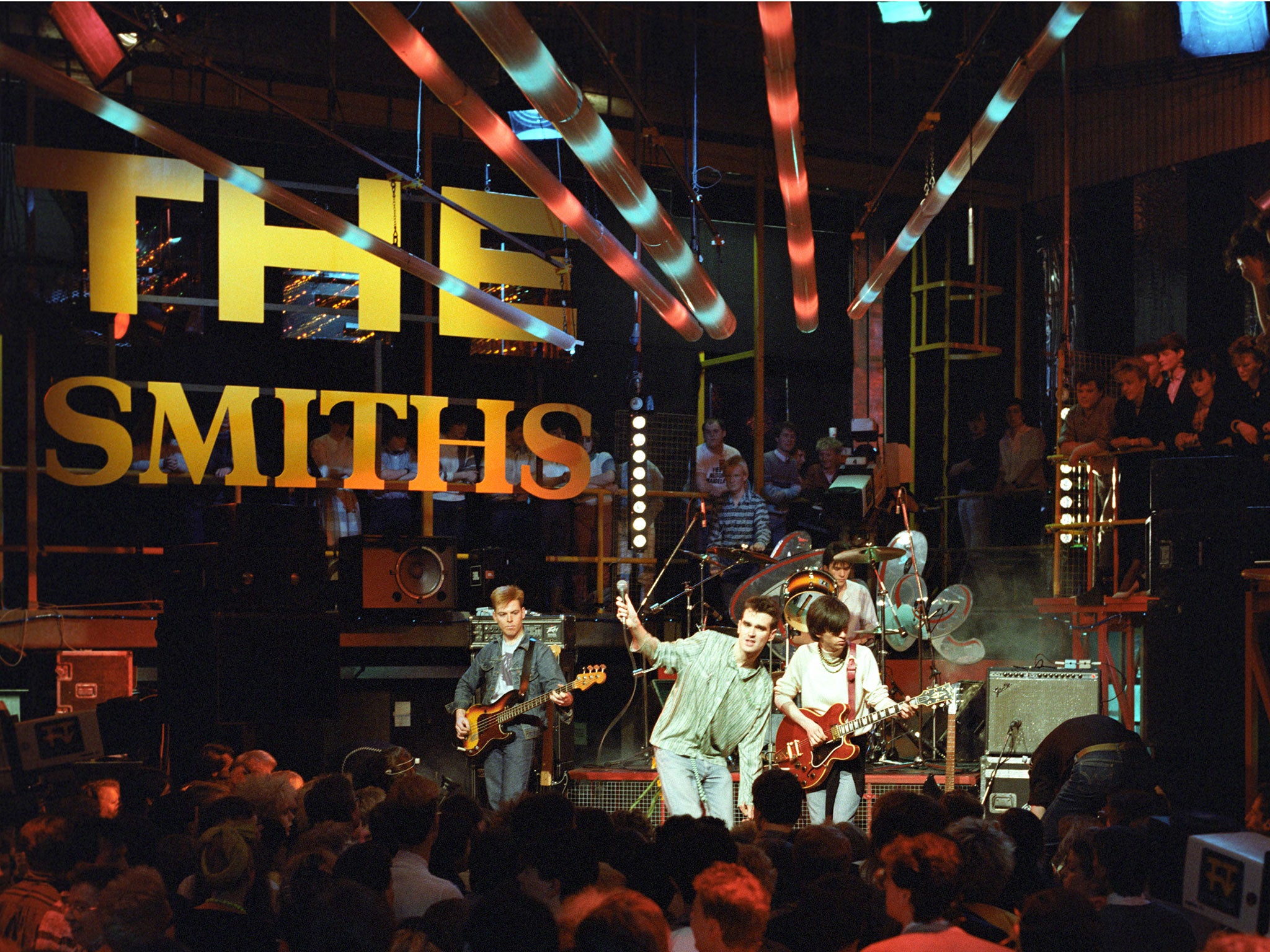Johnny Marr on embracing politics, his emotions, and his signature sound: 'I'm more proud to be a musician now than I ever was'
The Smiths guitarist's new album imagines an 'alternative society' without Trump or Brexit, where we're guided by higher beings... and he wasn't even on psychedelics when he wrote it, he swears

“I knew I wanted to write about society,” says Johnny Marr, tucking into a lunchtime bowl of chips in a central London bar. “Just not this society.”
So instead, the 54-year-old imagined his own reality. On his excellent semi-conceptual third solo offering Call The Comet, Marr conjures a part-utopian “alternative society” that “resets the ridiculousness of the last few years”: no Trump, no Brexit, a replenished ecosystem and humanity at its core.
Can anyone sign up? “I try and be as compassionate as I can,” he says. “I’d say that everyone is welcome. But there are plenty of f***ers that don’t make it.”
There’s nothing new in Marr looking to the future. Restless, obsessive, and “consumed by ideas”, he’s been in perpetual forward motion his entire life: to the next riff, the next song, the next band, the next project.
He flitted around bands in his teenage years before co-founding indie’s greatest group of all, The Smiths; since 1987 he’s formed Electronic, had spells in The The, Modest Mouse and The Cribs and collaborated with everyone from Paul McCartney and Neil Finn to Maxine Peake and Hans Zimmer.

Now there is a solo career that, by his own admission, has built more momentum than he ever dared think: the guitarists’ guitarist striking out on his own. “Even the press liked it,” he says with a smirk.
Less than 48 hours before we meet, Marr was in LA. Jetlag means he’s been pounding the streets of South Kensington at 5am as part of his “fits and starts” training regime. He’s vegan and hasn’t had a drink since 1999, although is not, as many assume, drug-free: “I quite like psychedelic drugs. I don’t mind a bit of acid.”
He’s trim and compact at 5ft 8in and, as ever, stylishly clobbered in a floral pink shirt and skinny jeans. His devilishly black mod cut now has blonde tints either side. He looks just like Johnny Marr.
These days he sounds like him, too. His two previous solo albums – 2013’s The Messenger and its equally direct and punchy follow up, 2014’s Playland – weren’t afraid to employ the jangling, dextrous riffs that defined The Smith’s five year existence. But there was a time when anything that recalled the past was left on the cutting room floor.

“I used to do that a lot in the Nineties, Bernard [Sumner, of Electronic] used to have a fit over it all the time,” he laughs. “I do have a signature sound, and I’m happy with that now.”
He corrects himself. “Well, I’m OK with it”.
After a year of “intense retrospection” on finishing his endearing 2016 memoir Set the Boy Free, Marr was desperate to write on the guitar again. Then he went to New York two days after the US election: speaking to friends there and in LA who felt “like they had no future” sparked the germ of a notion that would thematically thread Call the Comet.
“The record then became like a lifeline, like sanctuary from the outside world. For once I followed my emotions, and wrote not about an idea but how I was feeling.”
Trying to find the right balance between meaning and ambiguity, Marr is offering up a message of hope from his despair. “Some of it isn’t even out of the realms of imagination. Is it that unbelievable we could have a sustainable environment?” he asks. Conversely, there’s a fervent hope something won’t happen – namely Brexit: ”It’s an utter disaster and a travesty borne out of manipulation and deviousness.”
The record is not exclusively conceptual – The Smiths-y “Day In, Day Out” deals with Marr’s creative compulsion – but, inspired by sci-fi writers HG Wells and David Wallis, it’s more far out than he’s ever been: on the propulsive “The Tracers”, an evolved version of human life comes back to earth to guide us.
“It may seem fanciful,” he smiles, “but humankind has been worshipping some imaginary force in the sky for millennia. So sure as shit I can sing about it.”
It is a record of “magic realism”, and one to get lost in: atmospheric and dense, it swirls vividly with razor sharp riffs and jagged electronics. The drama in it is real: Marr would pull all-nighters at his new studio and HQ on the outskirts of Manchester, an old factory-style building overlooking the Pennines, projecting 15ft screens of Al Jazeera and Fox News onto the walls.
He would spend hours experimenting with effects pedals – “stuff these days you can get from moving a mouse on the screen, but you don’t get that level of performance” – to hone feelings of alienation and disconnect. “It was quite a psychedelic experience, not in a Sixties trippy way, more industrial and modern. I was into jarring my senses.” He smiles. “I actually didn’t need the drugs.”
Marr has always stood for things – The Smiths defined 1980s anti-Thatcherite counterculture – but it seems he’s never been more politically vocal, from his infamous David Cameron tweet to his recent project with Maxine Peake raising awareness of homelessness.
Increasingly, he sees his job as a badge of honour. “As a human, I still feel bohemian. That feeling is something I’ve identified with after everything that’s happened in the last couple of years. I’m almost more proud to be a musician now than I ever was.”

As an act of defiance? “Well yeah, but as an alternative mindset to those people and the people who support those people. You don’t even have to make socially conscious music, just be about something other than that, something other than materialism. Being pro-art, poetry, acting, scripts, videos… pro-creativity as an alternative lifestyle. It’s something that I’m proud to be a part of.”
Which brings us, with grim inevitably, to Morrissey. The recent views espoused by the ex-Smiths frontman – encouraging fans to vote for far-right party For Britain, expressing sympathy with jailed EDL founder Tommy Robinson – are polar opposite to Marr’s. What does he make of his former bandmate’s comments?
“Look, it’s just something that happens out there,” he says slightly exasperated, gesturing to the window. “If I was that arsed I would be able to concoct something. But I can’t even be f***ed concocting some answer. All anyone needs to know is that I oppose those views from Morrissey or anybody else.”
Marr has dealt with the fallout from The Smiths’ demise – he was just 23 when he quit the band – with rare dignity. He’s never taken the opportunity (and there’s been plenty) to stick the boot in. Is that because, given everything, him and Morrissey are still mates?
He spurts out a laugh. “I wouldn’t say that no. No, no, no. Haha, no we’re not mates.” He composes himself. “We’re just very different. But we always were very different people. But everyone knows that! Everyone knows everything there is to know.”
One thing they would still agree on is the power of music. Marr certainly believes in it: his new songs, he says, “make me remember that rock music can be modern. It can feel modern and it can sound modern.”
But can it ever be as culturally important as The Smiths again? “Why not? This odd little island is always capable of producing many interesting young boys and girls with something to say and who have the balls to put themselves on a pedestal.”
Is that how he feels about Call the Comet? “Look, I don’t have any answers,” he admits. “If all I’ve done is make a decent guitar record that makes people feel good when they listen to it, that’s the best I can do. And you know what?” he adds. “I’m all right with that.”
‘Call the Comet’ is out 15 June
Join our commenting forum
Join thought-provoking conversations, follow other Independent readers and see their replies
Comments
Bookmark popover
Removed from bookmarks